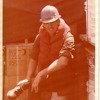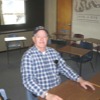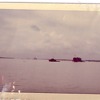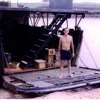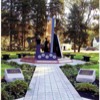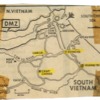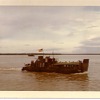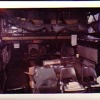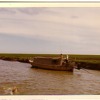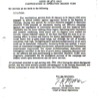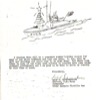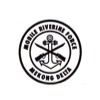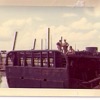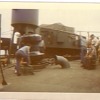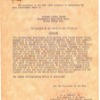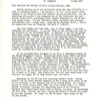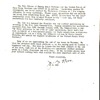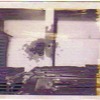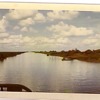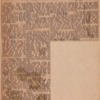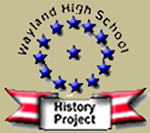

If you see this message, that means that you either do not have the latest version of Adobe Flashplayer installed (install it here) or you have blocked the ActiveX control for Internet Explorer. Please reload the page and allow the control.
 |
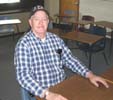 |
|
| Mr. Turner: 1960's | Mr. Turner: 2006 | |
| Mr. Turner describes a sudden ambush. | Mr. Turner recalls his experience when he returned home. |
Richard P. Turner was born on September 4th, 1942. Throughout his childhood he lived in various towns in the Boston area. His father worked in a number of professions ranging from the United Shoe Corporation to fundraising for local schools and colleges. Mr. Turner is the middle child, with one older and one younger brother. He describes his upbringing as “good.” When Mr. Turner moved to Wayland, he went to the Rivers School, but he joined the public schools for Middle and High School. His high school was in the present Wayland Town building. Upon graduation, Mr. Turner joined the work force.
After receiving a draft notice, Mr. Turner found it in his best interest to sign up for the Navy, and off to boot camp he went! When training had been completed, Mr. Turner boarded a jet that would eventually land him in Saigon, Vietnam. There, his responsibility entailed coxswaining boats and relieving tired gunners. Mr. Turner was stationed on an armored troop carrier hull designation T15213. In his time in Vietnam (from July 1968- July1969), he witnessed and took part in many of war’s hardships. His experiences demonstrate a devout patriotism to the United States of America and show his struggle to overcome a difficult time in our nation’s history.
This is Jen Nolin, and Amy Gredinger, Shari Kaplan, and Darren Thomason. We are here at Wayland High School interviewing Mr. Turner on Thursday April 27, 2006.
Q: Please state your name.
Mr. Turner: My name is Richard P. Turner
Q: When were you born?
Mr. Turner: September the fourth, 1942
Q: Could you describe where you grew up?
Mr. Turner: I grew up in Boston, Massachusetts and my parents moved to Wellesley. We lived in Wellesley for a while, and then we moved to the Chestnut Hill section of Newton, lived there for quite a while, and then in 1954 we moved to Wayland.
Q: What was your childhood like?
Mr. Turner: It was good. My folks were good. We had a good childhood. I am the middle of two brothers; all three of us had a good childhood.
Q: What did your parents do for work?
Mr. Turner: My father worked for the United Shoe Machinery Corporation; he also worked for United States Steel, in their public relations department. During the time he was at United Shoe he was going into the army through the Direct Appointment Program; where he went into the army and was rated at First Lieutenant, then went to Second Lieutenant then up to Captain. And he was the Procurement Officer for the Boston Ordinance District. Then he went to work, after he got out of the service, he went to the Steel Corporation, United Shoe Corporation, he worked for Polaroid for a while; then, he worked for Bentley College in the Development Department and Northeastern University in fundraising, and Chapel Hill School in Waltham he did fundraising for.
Q: When were you in high school and what were those days like?
Mr. Turner: When I was in high school, when we were in Wayland, I started out in the Town Building. School was good, a lot of fun. I was active in a couple of clubs. The first couple of years after we moved here I went to private school, I went to Rivers. Then my parents said ‘we’re going to put you in public schools’ so I went to Wayland Junior High, then I went to Wayland High.
Q: Were you ever in this building?
Mr. Turner: Yes I was.
Q: As a teenager how aware were you of World Events?
Mr. Turner: I knew what was going on. I knew we were having problems in South East Asia and Middle East. That’s been going on for years, and I knew about the war. We had it in history class too.
Q: When did you first hear about the Cold War?
Mr. Turner: The Cold War I heard about while I was in high school. It was actually the Cuban Missile Crisis; it was part of that. That was the year I graduated.
Q: Did you fear or dislike the Communists?
Mr. Turner: I feared them, because during that time that I was in school we went through that scare. And that happened right after I got into Wayland High School.
Q: What do you recall about the general state of the country as you came of age?
Mr. Turner: It was better then it is now. It’s a different society now. We didn’t have computers, we didn’t have cell-phones, we didn’t have high definition television, and we didn’t have cable. It was different.
Q: What, if anything, do you remember about the Korean War, or President Eisenhower?
Mr. Turner: I remember a lot about President Eisenhower. When he became president we were still active in Korea and then he got into Vietnam.
Q: How did you view John F. Kennedy?
Mr. Turner: He was okay. It was actually a tragic thing that happened to him. I thought he was a pretty good president, but he started leading us into war too.
Q: What were your plans upon graduating from high school?
Mr. Turner: My plans from graduation from high school were to work, after I graduated, and I did. I worked for the town for two years; then I got a draft notice. At that time they had the draft, and I said to my father, ‘I think I need to go talk to somebody,’ so we went over to Framingham, to the recruiting station. I talked to a recruiter over there and he explained all about the Navy. I really wanted to go into the Coast Guard, but there was a waiting list, so rather than get drafted into the army, I chose to go into the Navy. I had a little rough time trying to get into the navy because my math scores were low. Math was not my good subject, so I had to take extra courses to beef it up so I could get in. And I took the test and I passed; and I was sworn in Boston on the 25th of February, and off to boot camp I went, and when I got there I said, ‘Wow! What did I get myself into?’
Q: When did you first hear about the conflict in Vietnam?
Mr. Turner: That actually started before I even moved here. That actually started back in 1964.
Q: Did you worry about how it might impact your future?
Mr. Turner: Yup, I did. I was afraid that I would have to go and fight, and go into the military.
Q: Do you know when they started talking about the draft for the first time?
Mr. Turner: The draft had been going on for quite a while; the draft was what it was. They used it up until the sixties I believe it was, but I was scared of it. I had to register. When you turn eighteen you have to register. Yeah, you still have to, but they don’t have a selected service system anymore, it’s all volunteer. That is what scared me. I thought, ‘I know that if I am drafted into the army then I am going to have to go somewhere,’ so I chose to go into the navy. I enlisted into the navy instead of waiting for them to tell me ‘You are going here.’ I wanted some say as to where I was going. That’s why I did it, and at that time they were recruiting like crazy, they were getting ready to do something.
Q: The Gulf of Tonkin incident lead to the Gulf of Tonkin Resolution, giving LBJ more powers to dramatically escalate troop levels. When did you learn about the controversy regarding the truthful nature of the attack on the USS Maddox and how did this impact you?
Mr. Turner: I learned that on the news and I said ‘Here we go’. This is the first incident where somebody got shot at and I said to my father, I said, ‘Here we go, we’re gonna go to war.’ And believe it or not, that never happened, the Maddox incident. That is what I have heard. I have heard both sides of the story. I have heard that it didn’t happen and it was fabricated, I have heard it did happen. There are all kinds of movies and tapes out about it. I was scared then. I knew that something was going to happen.
Q: Can you describe what it was like in basic training?
Mr. Turner: Basic training, the first night I got there we flew from Boston to Chicago. We got off there, got on a bus; we were driven to the base. We drive in the gates and we hear a lot of screaming and yelling, ‘Get off the bus!’ We didn’t get any sleep the first day. We had to go into a big building and fill out all kinds of forms, and they fed you, and you got rid of your civilian clothes and they gave you navy issued stuff. You walked around in your civvies, you know, civilian clothes, for a couple days and then they started to issue uniforms. And it was a lot of yelling and screaming. You had to walk a certain way, and hang up your clothes. It took a little getting used to, and of course I went there in the winter- time, so it was snowing, and we would go on snow shoveling details. I didn’t mind, I accepted it. It is the way it is.
Q: What was it like saying goodbye to your friends and loved ones?
Mr. Turner: It was tough.
Q: Did you think about coming back? Or what it would be like for them if you didn’t come back?
Mr. Turner: Yup, I did. I did.
Q: How did your parents feel about it?
Mr. Turner: They were very supportive of me when I was over there; so were the neighbors. And I sent them letters when I could, or I called. There was a ship we could go to call them, but it was rough, it was rough.
Q: Can you describe what it was like leaving the United States?
Mr. Turner: The day I left I was on active duty stationed in Philadelphia, and I was called to the office. We were on a tugboat and the office was on a pier. The officer there said, ‘I have got a set of orders for you and you are not going to like them.’ He handed them to me and I said, “Uh oh I am going,’ and he said, ‘yeah, you are. Tomorrow you start getting your shots.’ So I had to go everyday to the dispensary to get shots for cholera, malaria, and all that. I needed to get physicals and had to get dental work done, everything. ‘Cause over there they didn’t have much. So the day I left, I had thirty days of leave, I left Wayland. My parents drove me into Boston and the first thing I had was a travel request and I had to get a ticket for California. I had to call a travel agency and the lady I knew asked me, ‘Is this a round trip?’ I said, ‘Marge, I’m afraid this is one way, it may be one way all the way too. I’m going to a place where it’s not going to be pleasant.’ So I got the ticket and I landed in San Francisco, all alone, don’t know California; asked them where the Mare Island Naval Ship Yard was. I got on a bus and they took me there, Greyhound. I checked in. There was twelve weeks of school; learn how to run a boat, learn how to survive if your boat is captured, what to do if you’re captured. Then in July we were put on a plane in Travis Air Force Base and flown to Saigon. We were in Saigon for three weeks before we even got down to the rivers: more training. Standing guard duty up on the roofs of buildings. It was bad, it was nasty.
Q: Was that the first time you were out of the country?
Mr. Turner: Yeah, first time I ever left the United States.
Q: How did you cope with making the transition?
Mr. Turner: I did all right; I thought a lot about home, but I made friends over there in my squadron; we all kind of stuck together. You couldn’t go anywhere in Saigon, you had to go in pairs, one guy had to carry a gun.
Q: What did you think you were there for?
Mr. Turner: I went over there with the attitude we were going to try and help these people. See, if we can get their country back together, and it kept getting worse, and worse, and worse, and finally it got to the point where we were fighting for nothing. Why are we here? We’re not making any progress, and the operations I went on were long. Some of them would last thirty days, forty days, and all you’re living in is a fifty-six foot boat.
Q: Were you there for multiple tours?
Mr. Turner: No, one tour only. It was thirteen months because it took a month to out-process.
Q: Did you believe in the “Domino Theory”, that once one nation falls to communism neighboring ones will as well?
Mr. Turner: Yeah, I do. I believe in that. Once it starts it’s going to go right through it. And it did, it went right through the whole country. And it’s even like that today, it’s still going. Look what you’ve got going in the Middle East.
Q: The N.V.A. and V.C. fought hard against the U.S. forces; did you see them primarily as communists seeking to spread the political system or nationalists seeking to get rid of foreign presence?
Mr. Turner: I saw both; they were trying to get rid of foreign presence and they were trying to take over the whole country. They were communists. They were big, big battalions.
Q: Did you think that the U.S. forces being there were just angering them?
Mr. Turner: I think they were. You see the whole war started off as a policing action; we had advisors over there. Then they started saying the advisors have to actually go out on the operations and they were doing all the work. And that’s when Eisenhower started putting troops in there, and then Westmoreland took over and he started more and more and more. We had a lot of people over that at the end of that; I think there was somewhere over 50,000 military in there. I felt like we weren’t getting anywhere. I mean, we would go on these river assault operations, go up these tiny little rivers, and we would never see anyone going in. Going in you would never see anyone. Coming out is when they got you. I can tell you about a firefight that I went through. To this day I don’t know how I ever got out of it. This is way down in the Maicong Delta, in the Uming Forest, which is way down in the very tip of the delta. We were told it was a thirty-boat operation. We were told we had to go in there, and U.S. forces hadn’t been in there in five years, so we started in on this river, very quiet, it had an eerie feeling like someone closing a door behind you. Once we got in there, we kept going up the river, we started receiving fire. Then it got worse.
Q: Fire meaning people were shooting at you?
Mr. Turner: Shooting off the banks. A couple of boats got hit and one boat got mined, a lot of casualties, so we stopped at the beach for the night, and in the morning we went further. Then, at the end of the operation, we were on the way out, this was at night and I think I was about the fifth boat and I heard a ‘Bang!’ My engineman came up and said ‘We have lost an engine, lost a shaft.’ I said, ‘Oh boy, that’s good.’ Apparently I ran over something and it got jammed in between the rudder and the prop so I had to be towed. And all the time I had to be towed through this firefight which lasted about six hours. We had to rig up some way of keeping our guns going because we could run the engine, thank god. The engine didn’t get hit, it was the shaft; we just disconnected it. We used the engine as a generator to run our weapons, and we made it through it, but we took some hits. We took a couple of hits. A couple of guys got hurt, the boat captain got hurt. He was taken off the boat and a couple of guys took over. It was really nasty. It was a nasty firefight. We would go on some smaller ones too, and at night we would go out and try to draw fire. Just two boats go out at night and cruise up and down the river, just trying to draw fire, and you could actually see them running along the banks, and how they were getting all of this ammunition and weapons! I don’t know whether you read it in your history books about the bicycle brigade- about how they strap all of the stuff on bicycles. They would go for five hundred miles, just walking. And they had a tunnel system over there- that was something. It was a bad war; it was a real bad war.
Q: How did you pass the time?
Mr. Turner: We worked off of support ships, so you could go on the ships, you could take a shower, and you could watch movies. You could go into the base; you were allowed to take the boat into the base at Dogtem. They had a club over there, and they had a swimming facility; all kinds of recreation stuff. That was an army and navy base combined. We could stay over there overnight as long as we had a radio with us. We had a portable radio so that the ship could call us if they needed us. We went in there one night, we were there for two or three days, and the ammo dump got hit. So we couldn’t come back; they sent more navy people in there to help. The base got overrun, what a mess. Explosions, barracks and buildings blown up, a lot of people hurt. It was nasty, really nasty. We were given one in country R and R and one out of country R and R. I went to Japan because my cousin was stationed in Japan at [Osaka?], so I stayed with him and we went around on tours and stuff; that’s a nice country. The in country R and R, I just didn’t take it. I saved it up so I could use it for my out of country, you could carry over the days; I think it was two days. So you know, that’s how you pass the time over there. You play cards on the boat, listen to the radio, and then you were continuously on operations, and then you would go on what they called base defense duty. There would be four or five boats, the whole squadron would be on it, and we would rotate; and you got out and just cruise around the ships at night, protecting from fire from the shore. And what we did, we would just cruise at idle speed, around and around and around. It got pretty boring.
Q: Did you count the days until you could go home?
Mr. Turner: Oh yeah, everybody did that. We had a chart.
Q: What were your specific responsibilities on the ship?
Mr. Turner: I was the boat coxen. I was the guy that drove the boat. Also, I would shoot the guns when the guys got tired, and they would steer the boat for a while. I would go down and relieve them on the gun. We had more fire -power on these boats than the big, amphibious ships.
Q: What was the hardest part of combat?
Mr. Turner: Getting shot at; 365 days a year you were shot at, basically.
Q: What were your search and destroy missions like?
Mr. Turner: We would go out at night, and we go along very slow, and we could see the enemy running along the bank and we would just open fire. We would try to keep them away from the banks. That’s what search and destroy was. Even sanpans that were floating along the river, we would stop them and check them. If there was no one in it, we would open fire and sink it.
Q: How did fear play into your state of mind?
Mr. Turner: It made me very nervous.
Q: Were you at all paranoid?
Mr. Turner: Oh yes, I was very nervous. I was very scared. It got so bad at night sometimes. There were two plates on the ramp; metal plates that are welded on and you actually start to follow them because you think it’s the enemy.
Q: How did you feel about the enemy combatants?
Mr. Turner: They were better trained then the U.S, some of them. Some of the women over there could fight better than the men in the U.S.
Q: Did you see anyone get injured or killed? How did it impact you?
Mr. Turner: I had a friend of mine get killed right in a canal. It was a town, right near a bridge. A sniper got him. They were laughing at me ‘Oh look at Turner, he’s got his flack vest on and his helmet, he must think something is going to happen!’ No sooner than they said that we hear this ‘Pow!’ and there was my friend Bill lying on the deck, dead.
Q: He wasn’t wearing his stuff?
Mr. Turner: He didn’t have anything on.
Q: Would that have protected him?
Mr. Turner: It might have, yeah. The flack vest, at the time, was state of the art. I went to a thing this morning where the Army Foremaster lab brought over the new thing that the army guys are going to be wearing in the Middle East. It’s a proto-type.
Q: What was it like?
Mr. Turner: It’s heavy. It’s body armor. It’s very heavy, and they got to make it lighter because the guys, if they’re walking they’ll die. I mean the heat will get them. It’s got that water saturation thing in it. You got to drink water all the time – body hydration. That’s another thing, we had to drink a lot of water over there.
Q: How did battle change you and what did you think about in battle?
Mr. Turner: It’s messed me up. I still get treated for it.
Q: Post Traumatic Stress?
Mr. Turner: Yeah, Still go the V.A. every three or four months to get treated for it. It’s affected my work, when I was working as a civilian.
Q: What did you do for work?
Mr. Turner: I worked at the naval base in Newport, Rhode Island when I got out of the service. I started out as a rigger because that was my rate specialty in the Navy. [Boatsingery?], is rigging, deck work. And I started out working in that profession and I couldn’t do it anymore. They wanted me to go way up high on a crane, and I couldn’t do it; I was too nervous for the job, so then they made me a truck diver and I began to have a series of accidents. I mean I was a good driver, it was just the pressure. I was under pressure all of the time. I can’t work under pressure; I go completely to pieces. Finally, before I retired, I was an automotive worker and I couldn’t do that job. Under law they have to do what they call Reasonable Accommodation, so they put me working in the marina, and I did well there. I liked that, and finally I got approval for a retirement with disability from Civil Service, and I got out, and that’s when I got back here in 2001.
Q: Are you involved in local things?
Mr. Turner: Yeah. I’m very active in Way Cam. I’m their Operations Director. I work with Jim, we do Town Meeting; I do a lot of stuff in the Town Hall. We do different studio work. I’ve done a lot of taping. In fact, I got selected for the Volunteer Award, and I do driving senior citizens to the hospitals. The Veterans Memorial Committee, I’m on that; Public ceremonies, cable TV Advisory Board. So I’m active, I stay busy. I live with my father and I take care of him, and I stay real busy.
Q: Were you able to distinguish between VC and non-VC?
Mr. Turner: Oh yeah! You can.
Q: How did you do that?
Mr. Turner: They had a red thing on their arm that they wore. ARVN were like us, they wore the camouflage uniform.
Q: How was the morale of the troops when you were there?
Mr. Turner: It was good. It was very high…but then you had the problems. You had the alcohol, you had the drugs, and that took a toll on a lot of guys. Thank god I never got involved in that. A lot of guys were doing that over there.
Q: During Johnson’s term he greatly escalated American troop levels to 520,000 by 1967 to ‘68. Did you think we were doing enough to win the war?
Mr. Turner: Well, at that time, ’68 is the Tet Offensive, the big one. I went over there right at the beginning of that, and that’s when all the fighting was going on, and Johnson wanted to increase the troop levels, which he did. When the war first started they only had two river assault squadrons over there. In ’68 they put two more over there, because they needed more. Johnson and Westmoreland kept asking for more and more and more troops because they couldn’t handle it over there. So, you know, that’s the bad part of it. I was dead set against that. They were trying to get a peace resolution started and they were talking peace, but yet they were sending more people over there.
Q: To your average soldier what would winning the war look like? What would have to be done?
Mr. Turner: Oh we would have to wipe them all out. I think that was the average young guy, ‘Kill them all and then we can get out of here. Just bomb the whole country, take them right off the face of the map.’ That was their attitude.
Q: Did you think that?
Mr. Turner: No. No, we were there to help these people. Try to get them straightened out where they could have their own government and everything. See, North and South were divided, and we were trying to get them to where they would talk to each other and actually form one country.
Q: What was leave like? Did you go to Saigon to have a good time, or what were the options?
Mr. Turner: Well, you could go to Saigon and have a good time, but there, again, you had to walk around with a gun. That’s really not having a good time. You had to be careful where you went there too. There was a section called Cholon that was off limits except for the PX that was over there. But the rest of the city you couldn’t go, but the guys would go anyways and they would get into trouble over there and they would wonder why. You know, you’re not supposed to be there. A lot of guys got shot in there, and you had to watch out for what you bought over there too; like drinks, because they would put broken glass in them. Same thing with ice, we use to buy ice for the boat. We were very careful how we bought ice because they would do the same thing.
Q: Did you ever buy a drink with glass in there?
Mr. Turner: You could always tell, just shake the bottle and see it in the bottom. I bought a bottle of something that had something in it. I didn’t touch it; I just threw it away. Another thing was water; don’t drink the water over there. You’ll be sick.
Q: Yeah, you mentioned you had to drink a lot of water over there, how did you get clean water?
Mr. Turner: We had a tank on the boat. We would go to a base and fill it. It was only 20 gallons of water too. You had to stretch it. Then we had 5-gallon cans that we put water in. Even though we got water from a reliable place you had to drop those salt tablets in there. Calazone tablets, like chlorine tablets.
Q: To clean out the bacteria?
Mr. Turner: Yeah. We bathed in the rivers and when I got home I had a rash all over me. It’s from taking baths in the river.
Q: The Civil Rights Movement was the front-page news at home. As far as you could tell, how did racial differences play out among troops? And, was there any tension and why?
Mr. Turner: A lot of blacks over there, a lot of black kids. In fact the Blacks were more in the Army then they were in the Navy or Marine Corps; but there were a lot of black kids.
Q: Was there tension involved with that?
Mr. Turner: Yeah there were a lot of racial tensions aboard the ships, because it was a mixed crew. In fact there was areas of the ship that you didn’t go.
Q: That the Blacks didn’t go, or the Whites?
Mr. Turner: No, the white guys didn’t go.
Q: Because too many black people were there?
Mr. Turner: Yeah, we were on, I think it was an APB, a barrack ship and I told this young officer, ‘you know, don’t go down in that area of that ship. I’ll guarantee you, you won’t come back’ He didn’t. He was killed, stabbed- jumped. In fact even at night you don’t go out on deck, because you’re not coming home– right over the side. Big investigation over that too. In fact the ship had to leave and go out to Anchorage, and anchor way out in the middle of the Ocean, almost, while this investigation was being conducted. They found who did it, but there was an awful lot of tension, especially on the base too. There were parts of the base that you didn’t go because there it was all black.
Q: As of 1967 opposition to the war increased reaching its height by 1969-1970. How did you perceive anti-war protesters?
Mr. Turner: Didn’t like them. We were there to do a job. We needed the support of the United States. We didn’t need the anti-war people.
Q: Do you believe in anti-war but supporting the troops, like today?
Mr. Turner: I believe in supporting the troops but not anti-war. I mean, we got a job to do over there. We got to get it done, get it done and get the troops home.
Q: Do you believe in limited war? Are you familiar with it?
Mr. Turner: Yeah, I’ve heard of that. Yeah, I’m familiar with it, but I don’t believe in it. I think we should just go in and do what we can do to help people and get their countries liberated, and get them back.
Q: Do you think that the United States politicians were restraining what you were doing over there?
Mr. Turner: Oh yeah, definitely! Especially when it came to using weapons, we had 50-callibers on the boat and we couldn’t use them because the politicians in Washington were worried about us hitting innocent people. When shooting started to get radioed negative 50’s we can’t use them. They would tell us ‘weapons tight for 50’s,’ we can’t use them. 30-calliber you could use but you shoot it for maybe ten minutes, you got to spend an hour un-jamming it. That’s not good if you’re in the middle of something.
Q: What were the Vietnamese people like? And, how did your view of the Vietnamese change over the months that you served?
Mr. Turner: Vietnamese people were actually quite nice. The actual civilians, they were quite nice, but you couldn’t tell who was the enemy. Farmers by day, soldiers by night. They would wear those black pajamas and you couldn’t tell whether they were VC or regular South Vietnamese people. A lot of them were sympathizers; they helped the VC move ammunition through that tunnel system. You couldn’t tell. It’s like today in the Middle East, you don’t know who the enemy is over there, you don’t know who you’re fighting against. The insurgency was just as bad there in Vietnam. It was the same way it is today, car bombs, and hand grenades thrown into a building. When I first got in country over there they put us on a bus and I asked the driver, ‘What are all the screens for?’ He said, ‘you’re in a war my friend! You don’t want to get the bus blown up!’ They put screens (like a regular school bus) put screens over the grillwork, over the windows. Somebody could come right along side and throw a charge right into the vehicle and blow it up. Over there everyone rode a scooter. You know those Lambretta and Vespa scooters? That was the mode of transportation over there. The streets over there were wild! I took a couple of guys in a Jeep and I said, ‘Wow these people drive bad over here!’ Of course I was young too. Actually I wasn’t that young, I was twenty-seven when I went over there. As far as the people, some of the Vietnamese people were very nice and they appreciated us being there, some didn’t. A lot of them worked with us as advisors. We had what they call ‘scouts’, there was a name for them I think they called them a [Diewee?]. You would pick up a [Diewee?] and then he would go on the boat with you and show you where some of the action was. And then of course we worked with Vietnamese Marines too. Those guys were pretty good too. But then they had these, what they call Mercenaries, these guys come from Cambodia. They fight by getting a head count, soon as they kill somebody they chop the ear off. They bring back what they’ve got, they leave the rest of it but they bring back an ear or a finger or a toe. It was gruesome; thank god I wasn’t on land doing it. I was in a boat. That was bad enough.
Q: Is that one of the reasons why you chose the Navy?
Mr. Turner: Well, that wasn’t the reason. My grandfather was in the Royal Navy, and it was in the family blood. I am the only one in the family that actually went into the military, out of three boys. My older brother, he couldn’t serve because of medical reasons. My younger brother said he was going to college and he wasn’t about to get drafted. He got hurt playing football here; he was in Wayland High. He asked my mother, ‘Can you call the doctor and get a letter saying that I’m unfit for military duty?’ He got a college deferment, but even while he was in college he got a draft notice; still had to go take the physical. He came and asked me, ‘What’s this mean?’ I said, ‘you got to go take the physical Matt! Just take the physical, that’s all. Don’t worry, you aren’t going to get picked because you’re in school, but the day you graduate from college you’re dead meat! They want you college kids because they need the expertise, they need it.’ See, I didn’t go to college I went right out of school after two years. He didn’t go, to this day I’ve never said too much about that. My father does, he believes in mandatory conscription, that everyone serves. Like in foreign countries it’s mandatory, over there, that you serve four years in the military. I’m a firm believer in that too.
Q: Do you think military or other options like Peace Corps?
Mr. Turner: Peace Corps is good! Yeah, they do a lot of good things. Vista is another good group too.
Q: What did you make of the Tet Offensive?
Mr. Turner: Tet Offensive was the lunar New Year. It was a very interesting time because when it first started nothing was really happening. About the third day into it is when things started to happen especially down in the rivers. We weren’t supposed to go out on an operation.
Q: Because there was supposed to be a truce?
Mr. Turner: Yeah, we were summoned to go on an operation that lasted forty-six days. They were all over the place, down in the lower delta, down all along the banks of the river, everywhere. They had to move the ships, move them further out away from the banks because they were afraid that one of the ships was going to get mined. In fact, one of the ships did get mined. The West Chester County had a hole in it big enough to drive a truck through.
Q: The My Lai massacre in 1968 is often seen as the classic example of the problems with the American presence and our tactics. How did you learn of this and what impact did it have on your views of the war?
Mr. Turner: I don’t know if he did what he was told or what, but in my opinion, he was used as a scapegoat. If they were in some sort of trouble over there, and they needed to kill all of those people- that they were shooting at them, but still I think the guys serving under him should have questioned, ‘Why are we killing all of these people?’
Q: So you think that the men under him should have been tried as well?
Mr. Turner: Tried to stop it. Same way with Oliver North, they used him, they grilled him, but that’s a whole other issue. My Lai, I think the guy did wrong; and then again, one side of me is telling me that he did wrong, and the other side of me is says he was doing what he was told.
Q: It was a free fire zone, right?
Mr. Turner: Yeah, a free fire zone. There were a lot of those over there.
Q: So, you’re supposed to kill everyone?
Mr. Turner: Well, free fire zone, anything that moves you shoot. Except for water buffalo, because you’re going to pay for it, $600. Don’t kill the animals.
Q: When Nixon was elected in 1968 he promised ‘peace with honor,’ and to gradually turn the war over to the South Vietnamese ARVN forces. Did this seem like a good strategy? What were your views on Nixon’s war plans?
Mr. Turner: Well, Nixon’s war plans were good. I don’t think that he had the backing that he should have had. Plus, the fact that he had Watergate staring him in the face, I think if he didn’t have Watergate, and he had backing from Congress, I think the peace resolutions would have come quicker then they did. Henry Kissinger, you know, lived in Wayland. Lived right out here on Old Connecticut Path for a while. He did a lot, Kissinger, he did a lot, and they really worked hard in getting that peace resolution.
Q: Didn’t he get the Noble Peace Prize?
Mr. Turner: Yeah, he got the Noble Peace Prize for that, but once it was signed, then the actual withdrawal didn’t start taking place for a year after. A lot of the guys thought it would happen right away. I wasn’t over there in ’75, but during those Paris peace talks, I was still on active duty. They thought it was going to happen, like tomorrow. It doesn’t work that way.
Q: The shootings of Kent State students at a May 1970 demonstration received a great deal of press coverage. What did you make of these college kids’ actions?
Mr. Turner: I think they were trying to send a message that we needed to get out of there, but then you had the overzealous National Guard people that started shooting, and a lot of innocent young kids got killed for no reason at all. That was bad.
Q: Did you think it was really minor compared to what everyone was facing over in Vietnam?
Mr. Turner: Oh yeah, that was minor, that was nothing. I don’t know whether you’ve ever been to Washington and seen that down there. All those names, those were all young kids, a lot of them.
Q: Were you upset when you heard about the kids protesting or were you more upset when you heard that they were shot at?
Mr. Turner: I was most upset when they were shot at. I mean there again you got your overzealous National Guard people going in there acting like a SWAT team and start mowing them down.
Q: What was it like when you knew you were coming home? How did it feel to be on the jet taking you back to the USA?
Mr. Turner: Freedom Bird, back to the real world! Well, we got on the plane. It was a twenty-two hour flight. It was a total of twenty-two hours from Saigon to Boston. We made fuel stops first at Clark U.S. Airbase in the Philippines, then Hawaii, then Travis. Once we got into Travis, we had to go through customs. We had to go into this building and dump out all of our duffle bags. In the navy we call it sea bags. We had to dump our sea bags out. They go through all of your clothes, if you have carry-on luggage then you have to show that too. They are making sure that you weren’t bringing back weapons, drugs, or any kind of contraband. Some people brought back those big k-bar knives. They got confiscated along with bayonets because the blade is too long. So then you repack all of the stuff and you go and get fed. I only had two hours to get from Travis down to San Francisco to catch a flight to Boston. So I got fed real quickly and I got on the bus because they had military buses to take you to San Francisco. I got there and I caught the flight to Boston. At that time, they didn’t want you to travel in uniform; they wanted you to travel in civilian clothes. All of my civilian clothes were in a trunk and they all had gotten mildewed. There was only one suit that looked halfway decent, but it hung on me like a sack because I had lost so much weight over there. I got into Boston, I landed at Logan, and I was walking through the airport and some guy yelled out and called me a ‘Baby killer’ because he knew that I had just gotten back from Vietnam. I turned around and I smacked him. I had to explain to the police ‘I am a Vietnam veteran, I just got back, and I don’t appreciate that kind of stuff.’ He said ‘Don’t worry about it, I’ll get you out of here.’ So he got me out of the airport to my parents. I had to go get paid because I had left all of my money on the books, so we went over to the Navy guard and I got paid, and I asked my father if I could drive home, I hadn’t driven in over a year, and he said, ‘No, you better not.’ I didn’t drive home. I got home and the way people treated you was different. They looked at you like you were some kind of a nut, like a baby killer that wanted to kill everyone, so then I got thirty days leave. Then I reported aboard to a brand new submarine tender that was being built down here in Quincy. I managed to live at home for over a year; I just went back every day to the shipyard. Plus, I had a fairly good duty slot; I was CO’s driver. It was because I knew my way around the area here.
Q: Was it hard saying goodbye to your friends from the war?Mr. Turner: Oh yeah. I still keep in contact with some of them. My boat captain lives out in Iowa and sells commercial real estate. I haven’t talked to him too recently, maybe a year ago.
Q: You said that you lost a lot of weight, was it because the food was really bad?
Mr. Turner: Yeah, you live out of a cardboard box. Sea rations; ham and eggs, peanut butter and jelly, fruitcake. Yeah, it was a cardboard box. The only hot meals you got was from a little butane stove where you could heat stuff, but we would get meat and then take it down and we could wrap it up in tinfoil and put in on the top of the engine. We would heat up food that way, boil water. We had to distill the water, we had to make our own. That is why I lost a lot of weight. If you were onboard the ship it was all right, but if you were out on the field eating those sea rations…. Some of them were packed in 1945, from the war. Some of them were old. The old Chesterfield cigarettes, that’s what they had in there. They were real old.
Q: You mentioned that when you got back people kind of looked at you funny. How was it then, reuniting with your friends and family? Were they more accepting or did you feel distant?
Mr. Turner: Yeah, they were more accepting. My parent and the neighbors threw a big party for me. It took a while to get adjusted, and then I went on the ship that I got assigned to, and I was on that ship for seven years. I would say my third year on the tour was when I began to have problems, especially with authority figures, so I went to the ship’s doctor and they started doing some evaluations, and I had to go every month to see a psychiatrist. I still go to see a psychiatrist and I am on medication for anxiety and I take an anti-depressant. For a while they had me on Valium, and I got off of that. They told me that when I moved back here to Bedford, I didn’t need Valium, so they took me off of it. It was like going through withdrawal. It was very habit-forming, but I did a good job with it, and when I started working as a civilian, that’s when they decided that I better retire because of my disability. I worked hard on that to get it too. I got 100 percent out of the VA. They had good doctors working with me; that’s nothing to sneeze at. Have you ever looked at a VA rating scale? Its 2,338 dollars a month. Plus being retired of civilian employment, I go on what they call ‘social security disability income.’ That is 1,300 a month. Then they passed a bill about three years ago called ‘Combat Related Special Compensation.’ That is 1,200 a month. So all in all I get over 5,000 dollars a month. And I still got the retroactive money in a savings account. I never spent it. From the CRSC, I never touched it.
Q: Have you ever been to the Vietnam War Memorial Wall? And what was that like?
Mr. Turner: I have been there several times. It was nice, very moving.
Q: Did you look for names?
Mr. Turner: Oh yeah, I had a regular list. Actually, you can look them up on the Internet. There is a website out there, but it is different when you go there. When I lived in Rhode Island, a bunch of us vets would get a motor home every memorial day for Veterans Day. We would stay down there for three or four days. Did you know there were actually veterans guarding that wall? They stay there; they don’t want anyone to touch it. That’s what got me inspired to serve on Wayland’s veteran’s committee. We built that memorial, have you seen it? That was a lot of work. We actually had a breakfast this morning at the senior center. It was our turn to do the men’s breakfast. We did that this morning.
Q: How did you react to the role that Vietnam played in the presidential campaign of 2004 with Kerry and the swift boats and Bush and his unaccounted time in the National Guard?
Mr. Turner: Someone was lying. I am not a democrat so I don’t really support what John Kerry did over there. I did buy that disc, ‘A Stolen Honor.’ You know, that DVD that they put out. Actually some of the stuff they said in there was truthful. Especially when it came to the medals because some of those medals he didn’t really earn, and over there, during that time during the war, the record keeping was a little bit screwed up. I got a scratch and I got a purple heart. I mean the boat got hit and I got a piece of shard that hit me, it scratched me it didn’t even do anything. They said ‘We’re putting you in for a purple heart.’ I said ‘No your not, give it to some guy that deserves it.’ ‘Nope you have got to get it.’ So I got it but I never got the citation for it, so I belong to this veteran’s organization where this guy actually got me the citation. It is a framed thing that is signed by the president. I don’t know if you know him, the state commissioner of veteran’s affairs? Tom Kelly, he was my CO while I was in Vietnam. I have spoken to him on the phone. He was my division commander.
Q: Do you still have the medals?
Mr. Turner: Yeah, I have all of them. I have something like twelve ribbons.
Q: As you reflected on the war over the years, how do you view it differently than when you were a young man?
Mr. Turner: I view it as a job that I had to do. I try to put it behind me. But you can’t, you think of the young kids over there fighting. In fact, I have a friend of mine over there now in Afghanistan who has been over there for two years.
Q: What parallels do you see between Vietnam and now?
Mr. Turner: Afghanistan is a very mountainous country. In Iraq you don’t know who the enemy is, with the insurgency that is going on over there. In Vietnam you didn’t know the enemy. You could see who the regulars were because they would wear that big red band on their uniform and the star on their flag, the North Vietnamese flag. I reflect what I did and what they are going through, and ours was fairly easy in comparison. Nowadays in the Middle East you don’t know who you are fighting. You got car bombs going off; I mean everyday there are kids getting wiped out over there.
Q: What are the lessons that you have learned from Vietnam?
Mr. Turner: Keep your head down and hope that you don’t get shot at. Pray. Go to church when you had the chance, on the ship, and on every boat, we got selected a carrier Chaplin. And the Chaplin had to act like he was part of the crew, like he was an officer. He actually had to man a gun. We had a total cease -fire and he kept firing so one of the guys had to hit him over the head with a wrench. He wasn’t supposed to be shooting. But the Chaplin was there for a reason, even though the guy upstairs is really controlling.
Q: What are the lessons that the Nation learned or should have learned from this conflict?
Mr. Turner: We should not be the world’s policemen. Every country should be able to fend for themselves and do their own cleaning up in their own countries instead of asking the United States to come and help them. That’s what happened in Vietnam with the French. They couldn’t handle it. So the United States had to come in after they bailed out. The French just walked away. The United States went right in thinking “Oh we will help”, and they were sending money and everything else; but they shouldn’t do that. Every country should have their own military to fight their own war.
Q: Did the war increase your patriotism towards the United States?
Mr. Turner: Oh yeah, my father puts up the flag everyday. I am very conscious of flags all over town. I will call people up if their flag is torn and say ‘Take it down, it’s torn.’ If you aren’t going to fly it right, then don’t fly it at all.
Q: Were there Jewish people in Vietnam?
Mr. Turner: A lot of Jewish kids, all faiths. We had different chapels and each chapel had to know all of the faiths. They had to know Jewish, Catholic and even Buddhist.
Q: Was there discrimination or disagreements between the different religions?
Mr. Turner: No, not really because that was something we never got talking about. That could end up in a real heated argument.
Q: Was there ever a time (thinking back to when we discussed the racial disagreements) when the situation was getting real bad and people just decided to work together and forget the tensions on the boat?
Mr. Turner: Yeah, they did. By the end of the tour the black guys were pitching right in with the white guys. We all wanted to get out of there. We had a black guy on our boat. He was a good worker that guy. He was a mechanic before he came into the military, so he knew his stuff. That was a whole deal, when you came back from an operation you had to rearm your boat, check your engines, fill out a boat report, and be ready to go again. You could be called within a moment’s notice. Before we did anything we made sure we had plenty of ammunition on the boat, and plenty of water because we never knew when we were going to get called. You had to top off your fuel tanks because you just never know. That happened to us twice. We came back to the base, tied up the ship, and the boat captain says, ‘You guys we just got a call on the radio and nobody leaves yet, we have to rearm the boat because we are leaving in an hour.’ Of course you hear the guys ‘Oh this is bullshit!’ And I, being older than most of them said, ‘Fellows you are in a war. You never know, Charley might be out there doing something.’
Q: So most of them were really young?
Mr. Turner: Yeah, the average age over there was 18 and 19. Since I was older, they talked to me, ‘When are we going to get out of here?’ I said, ‘When your tour is up, you have to do the job.’ The boat captain was about a year older than I was and we would talk to the young kids. The kids would say, ‘I want to get out of here, kill them all!’ We actually had a couple of kids flip out; one went off the deep end and he started shooting just for the heck of it, yelling and screaming. We had to take him off the boat and he was brought to a hospital in Saigon. He lost it; stress got to him. It was so hot over there too, 106 degrees in the shade. When we were running that boat over there we had to wear a helmet, a flack jacket, a waist protector, a canteen, and it was so hot. That’s why I have skin cancer, from being in the sun over there, but that’s how you walked around over there.
Q: What did they do to raise morale?
Mr. Turner: We would get a beer ration every week. We got two cans a week, but all the beer we drank was treated with formaldehyde, a preservative, because it was stored in the heat. They kept the beer in the pontoons and a couple days before they were going to have the beer blast, they would move them to the reefer decks to cool it down. We had a cook on the ship that drank his beer too fast, and with all of the preservatives you get to feel woozy, plus, he was drinking warm beer. He was sitting there, and he fell off the boat in between the two pontoons and that river was 12 knots, so he fell off and he drowned instantly. He got sucked right under. The funny part of the whole tour over there was that you had to tie up against other boats in a nest, and the boat captain came down one day and said, ‘Go and get the guys’ paychecks,’ so we let go of our lines, and the current over there is very strong, and I didn’t have enough R.P.M.’s and I got caught as I turned and I got swept up against the other boats. I had a heck of a time getting out of there; I actually had to have another boat pull us out. But when you came into to tie up to those barges you had to go wide open or else you would not be able to tie up to those barges.
